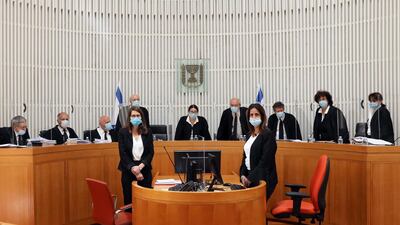Israel's Supreme Court has tackled the question of whether a political deal to form a coalition government after three inconclusive elections in less than a year is actually legal.
A ruling against the pact could leave Israelis facing a fourth poll.
Under the proposed three-year agreement between Prime Minister Benjamin Netanyahu and election rival Benny Gantz, each man would head the government for 18 months.
But eight petitions have been sent to the court, urging it to declare the deal illegal. One of the petitions was sent by Yair Lapid, head of the opposition party Yesh Atid and a former ally of Mr Gantz.
On Sunday, the court spent seven hours hearing other challenges to Mr Netanyahu serving another term as prime minister, based on the fact he faces corruption charges.
Some commentators say that tactic is unlikely to succeed in light of comments from Israeli Attorney General Avichai Mandelblit, who said there was no legal basis to prohibit Mr Netanyahu from taking office.
But Mr Mandelblit said "certain arrangements in the coalition agreement raise major difficulties", although he said there were no grounds to throw out the whole accord.
"Today ... the court will dive into the details of the coalition agreement – and this is where the decision that will bring about a fourth election could be made," Tova Tzimuki wrote in Israeli daily Yediot Aharonot.
"The disqualification of any one section of the agreement ... will cause the unprecedented legal construction on which it is supposed to be based to wobble."
The arguments are being heard by a panel of 11 judges, who are wearing face masks and are divided by perspex panels as part of measures to prevent the spread of Covid-19.
Proceedings are being streamed live on the court's website.
A ruling is expected by Thursday, the deadline for forming a government under electoral law.
Mr Netanyahu is charged with accepting improper gifts and illegally trading favours in exchange for positive media coverage.
He denies wrongdoing and his trial is set to begin on May 24.
Israeli law bars an indicted person from serving as an ordinary Cabinet minister, but does not compel a criminally charged prime minister to leave office.
The main argument against the coalition deal concerns specific provisions that opponents say breach the law.
The agreement would allow Mr Netanyahu to serve as prime minister for 18 months, with Mr Gantz as his "alternate", a new title in Israeli governance.
The men will swap roles midway through the deal before likely taking voters back to the polls in 36 months.
But Israeli law traditionally endows governments with four-year terms, an issue pounced on by opponents of the deal.
There is also a provision freezing certain public appointments during the government's initial six-month pandemic emergency phase, which critics also say is illegal.
Mr Mandelblit, who indicted Mr Netanyahu, recommended problematic provisions were reviewed "at the implementation stage".

